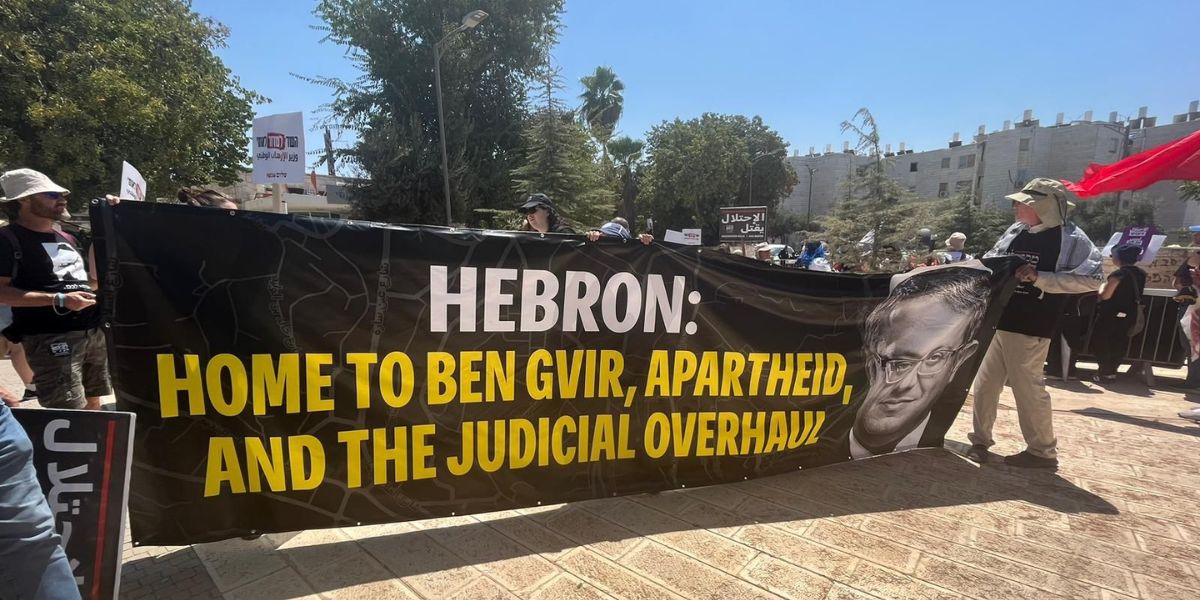Cover photo: Israeli activists protest against the judicial overhaul in Hebron, the Palestinian city in the occupied West Bank where Israeli minister Ben Gvir lives in one of the settlements that are illegal according to international law. Credit: Breaking the Silence.
For months, Israelis have been taking to the streets to protest the judicial coup that the current rightwing Netanyahu government has planned through a series of legislative changes since it came to power in December 2022.
“The new government in Israel is the most right-wing government ever elected, and what they’ve been doing since they were elected and the coalition was established, is trying to change the regime in Israel and to do some quick changes in the way the checks and balances function in the Israeli democracy. They’re trying to weaken the judiciary, to weaken the High Court, to have the right to appoint judges and in a way to give the only power to the government”, explains Dana Golan, Co-Director of Ofek – The Israeli Centre for Public Affairs – to CIDSE in an interview in March 2023.
If the Knesset, the Israeli legislative body, passes these laws, the Israeli judiciary will be severely weakened. The governing coalition would be able to override High Court decisions, appoint legal advisors and judges and pass legislation that is harmful for human rights. In sum, these changes would lead to a curtailment of human rights protection and would have an adverse impact on the separation of power and the independence of the judiciary.
This July, the Knesset passed the first legislation called the “Reasonableness Law”. This amendment to one of the Israeli basic laws (which function as a de facto constitution) prevents the courts, including the High Court, from reviewing government and public authorities’ decisions on the ground of reasonableness, for example when they are violating basic human rights. Now, the government will be able to act with legal impunity when further restricting the rights of minorities, Palestinians and women.
38 Israeli rights organisations petitioned the High Court to overturn the decision, among them also CIDSE Partners Adalah, the Legal Center for Arab Minority Rights in Israel and Yesh Din, volunteers for Human Rights. Their petitions will be considered by the High Court on 12 September. According to our partners, as well as eroding democratic norms in Israel, this undoing of the judiciary will have a significant impact on Palestinians, both in Israel and the occupied territory. The changes will further weaken Palestinian’s access to justice in a context where courts already systematically support settlement expansion and occupation.
“There are two main revolutions that are now happening. The first one is the judicial overhaul, the attempts by this new government to basically get unlimited power by weakening the High Court and the second revolution that is happening simultaneously and together with the judicial overhaul, is the annexation of the West Bank, which is continuing at full steam. The judicial overhaul is basically a tool to achieve different ends, and one of the main targets that they’re trying to achieve is a full annexation of the West Bank”, shares Ori Givati, Advocacy Director of Breaking the Silence.
Watch Ori Givati and Dana Golan explain what is at stake:
This interview was carried out in March 2023, during a visit of Ori Givati and Dana Golan to Brussels.
Additional information
Misereor Press Release: “Israel: Pressure on civil society grows”. August 2023

